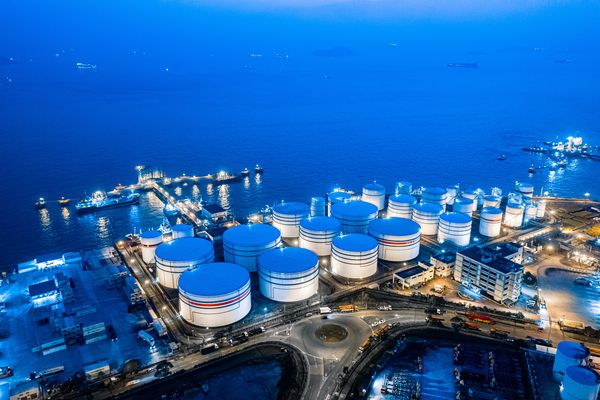Since 2008, domestic crude oil production has soared. In fact, the U.S. pumped out more oil last year than it has in at least two decades.
Production has grown so rapidly that midstream companies, which are working tirelessly to build out the pipeline infrastructure necessary to support the domestic oil boom, just can't seem to keep up. We're simply pumping out way too much oil.
That's why railroads and other alternative transport methods have become increasingly important in recent years, giving pipelines a run for their money. And if recent developments are any indication, rail-based crude shipments should continue to grow over the next several years.
That's good news for Warren Buffett's Berkshire Hathaway, which bought out the nation's largest railroad company more than three years ago. Let's see how that bet might turn out.
Buffett's BNSF optimistic about crude shipments
Buffett's decision to take over Burlington Northern Santa Fe LLC, or BNSF, in 2009 was predicated largely upon his belief that a recovering U.S. economy would boost growth in the highly cyclical rail industry. While the bet has turned out to be a great one so far, its future success will likely be driven by further growth in crude oil shipments.
Though crude shipments accounted for less than 0.1% of the company's overall traffic in 2010, that figure increased sharply, to 1.7% in 2012 and to 2.7% in January this year. BNSF's CEO Matt Rose said he expects his company to ship some 700,000 barrels a day by year's end, up from 525,000 currently.
In fact, he reckons BNSF's crude shipment volumes could eventually surpass a million barrels per day. BNSF expects to spend some $200 million this year to add tracks and new siding near North Dakota's Bakken oil field, a region with tremendous demand for crude rail shipments.
Similarly, Union Pacific (UNP +0.38%) plans to spend about $250 million on assets primarily related to its crude oil business. The company, which shipped 300,000 barrels per day in February, said that current crude shipment volumes are twice what they were a year ago. Both companies are bullish about the outlook for crude shipment demand, suggesting that it will remain strong for years to come.
Crude oil cushions against coal shipment fall-off
Union Pacific and BNSF's capital spending plans and outlooks for crude shipment growth highlight an important trend. Rail-based crude oil traffic has exploded over the past couple of years, representing one of the most radical changes to grip the U.S. rail industry since the Staggers Rail Act of 1980 deregulated it.
The surge in demand for crude rail shipments has been a lifesaver for U.S. rail companies, many of which have seen shipments of coal – traditionally their main commodity by volume – plunge, as cheap natural gas has radically altered the industry's fundamentals.
For instance, fourth-quarter coal volumes at CSX (CSX +0.52%) and Norfolk Southern (NSC +0.28%) declined 19% and 13.2%, respectively, from year-ago levels, dragging coal revenues down 18% at CSX and 23% at Norfolk Southern.
Potential threats and final thoughts
While some suggest that the massive pipeline build out currently under way in the U.S. poses a threat to railways' crude shipment volumes, executives at Union Pacific and BNSF remain largely undeterred.
Union Pacific's CEO John Koraleski expressed confidence that energy companies would continue to rely on rail even after new pipelines become operational, citing rail's flexibility, consistency, reliability, and speed to market as driving factors. Indeed, several U.S. refiners have already invested heavily in new rail terminals and tank cars.
For instance, Phillips 66 (PSX 0.55%) last year ordered 2,000 rail cars to ship crude from North Dakota's Bakken Shale to its refineries along the U.S. east and west coasts. And last week, the company announced plans to build a crude oil unloading facility at its Ferndale, Wash., refinery, which will allow the plant to receive oil shipped via rail.
Similarly, Valero (VLO 0.18%) announced earlier this year that it is planning to purchase 2,000 railcars to boost rail shipments to its refineries. It also unveiled plans to construct a new crude oil "topper" unit at its 90,000 barrels-per-day Houston refinery, which will help it process more light crude oil.
Judging by the millions of dollars these and other refiners have ploughed into new rail-unloading facilities and tank cars, they almost certainly share Union Pacific and BNSF's optimism about the future of crude transport via rail. Pipelines be warned: Rail's not going down without a fight.










